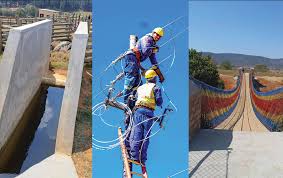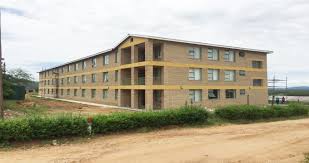
By Delisa Thwala
The Microprojects Programme (MPP) is making a huge impact on the lives of ordinary Swazi’s through establishing self-help infrastructure projects in the rural and semi-urban areas.
Director of Microprojects Sibusiso Titus Mbingo has highlighted some of the projects done by the government through the unit. He said that over E1 billion allocated to microprojects has been used to implement various programmes that bring development to communities.
He further said Microprojects, a unit under the Ministry of Economic Planning and Development, continues to improve the lives of ordinary EmaSwati through its 129 projects under the Community Special Development Fund (CSDF).
Of these 129 ongoing projects, 14 are agriculture sector projects. The agriculture projects include 12 dip tanks, one veterinary office and the installation of a fence in one grazing scheme.
Other projects include 15 water schemes, 24 rural electrification schemes, 41 transport and communication sector projects, four-foot bridges, 16 low-level bridges, one bridge, and 20 road concreting projects.
The primary purpose of the MPP is the impact of the Microprojects programme on rural households who are beneficiaries of projects established through the MPP.
To determine the impact of the project, households were stratified into two groups: beneficiaries and non-beneficiaries. The purpose of the programme is to eradicate poverty through the improvement of the socio-economic status of the rural dwellers, which therefore increases the consumption rate and standard of living in rural areas and peri-urban areas.
The Government of Eswatini has prioritized rural development and has intensively engaged several international organizations on the verge of bettering the lives of rural areas.
One of the units established in 1988 is the Microprojects Programme, a semi-autonomous unit operating under the Government of Eswatini in the Ministry of Economic Planning and Development.
It depends on government funds to operate and achieve the mission of poverty alleviation.

According to Mbingo, the unit has been able to use the participatory approach to aid in the education, health, agriculture and infrastructure sectors for the past years.
It provides an exceptional approach and expertise in project assessment, implementation, monitoring and evaluation following the project stages.
Micro Projects has also built 32 community centres, five community markets, 27 community halls, and three projects under the health and welfare sector.
These include two neighbourhood care points (NCP) and one nursing home.
Mandla Nkambule, CEO of Youth Enterprise Revolving Fund, when addressing residents of Nkhaba about opportunities presented by the Youth Fund.
He said the government had spent E800 million on 1170 community infrastructure projects to bring development and services to over 190 000 emaSwati.
The Microprojects Programme Coordinating Unit, a semi-autonomous unit under the Ministry of Economic Planning and Development, has carried out the projects.
The Dr Tambo Gina-led ministry has stated that up to date, overall, it has implemented the construction of 53 bridges, 95 rural electricity schemes, 10 roads, ten footbridges (Tebetebe, 12 truss-footbridges, 15 dip tanks, four vet offices, four grazing schemes, 47 water and sanitation schemes, 21 community halls, and five markets under the community development projects.
Furthermore, the ministry has disclosed that it has implemented 292 infrastructure projects in primary and secondary schools, nine in tertiary institutions, 15 health centres, 21 projects for various ministries, and procurement of 18 tractors, 13 hammermills, two buses, and two trucks amongst other income-generating projects.
The government issued a total expenditure of E360 million for community and capital projects in the financial year 2020/2021.
ALSO READ:Project developers inject E1.5bn into economy
The unit implements community demand-driven projects, capital projects for various government ministries and projects under the Regional Development Fund (RDF) for the Ministry of Tinkhundla Administration and Development (MTAD).
It has been disclosed that total expenditure for community and capital projects amounted to E364 011 906.69 during this period, while spending realized under the RDF amounted to E23 537 229.21. Worth noting is that though relatively low expenditure is seen, existing commitments are significantly high.
According to a report in this publication, 23 community demand-driven projects were completed and are functional. These comprise 19 electricity schemes, one water supply scheme, one suspended footbridge and two community centres.
These community projects are projected to benefit an estimated population of 47,050 directly. It has since been reported that 68 capital projects were completed, 66 for the Ministry of Education and Training and two for the Ministry of Defense.
Activities executed for the Ministry of Education comprise the construction of classrooms, staff houses, toilets, laboratories, administration blocks, laboratory fittings, conducting hydrogeological surveys, borehole drilling and rehabilitation of various school structures.
MPP completed the construction of a sewing factory at kaGcina Army Barracks and a hostel at Mbuluzi Army Barracks for the Ministry of Defence.
The Regional Development Fund completed 73 projects, four Income Generating Projects (IGPs) and 69 Infrastructure projects. These projects are projected to benefit an estimated population of 30,930 directly
Community demands drive infrastructure projects
It has been stated that the unit implemented community demand-driven projects in six sectors: Agriculture, Water Supply and Sanitation, Education, Transport and Communication, Rural Electrification and Community centres.

Some water supply and sanitation projects are implemented in partnership with the Republic of China in Taiwan. MPP collaborates with Engineers in Action (EIA) to construct suspended footbridges.
Two hundred thirty-nine projects were implemented in 2020/2021. Twenty-three projects were completed. These comprise a water supply scheme, a suspended footbridge, electricity schemes and two other projects.
ALSO READ: Proposed Ndzevane Factory Shell Construction Bringing 1 000 Jobs
Eight projects were completed but are still at DLP; these comprise five water schemes, one dip tank, and the concreting of two road trips. There are currently 208 projects under implementation in the various sectors.






